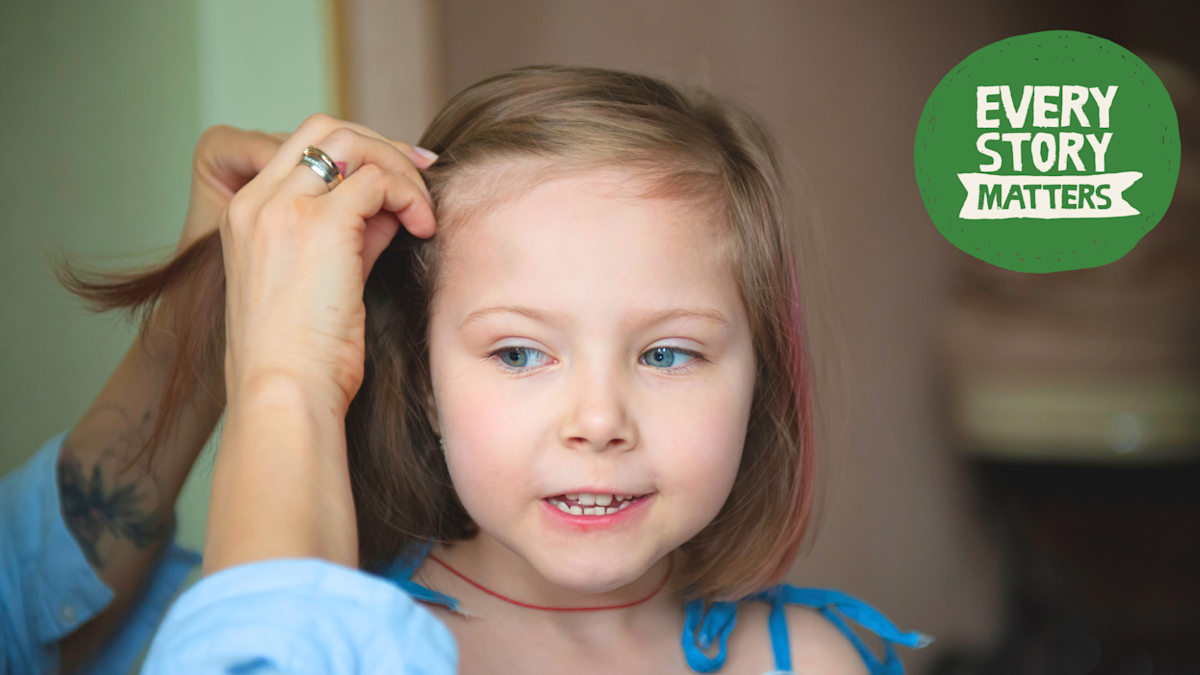A simple conversation, inspired by Therapeutic Crisis Intervention training, unlocked the solution to end a five-year-old’s daily pain and tears.

Image: A young girl looking off to the side while an adult does her hair. Every Story Matters - Logo.
Some everyday tasks, which are easy or simple for some people, like combing your hair, can be an extremely uncomfortable and painful experience for children who are neurodivergent or who have tactile or touch sensitivity. The feeling of a brush on their scalp and pulling of any tangles can cause a lot of pain, and braiding or tying up hair can cause it feel tight on their head, resulting in headaches.
This has been the daily experience of five-year-old Sara*, who would become stressed and extremely upset when she had to brush her hair to get ready for school.
While attending a Therapeutic Crisis Intervention for Families (TCI-F) training, Sara’s carer, Elissa, started chatting with Phi Theodoros, TCI-F Trainer and Living Arts Resident Artist. Phi found Elissa demonstrated a beautiful awareness of how to best support a neurodivergent child and was very aware of her sensory needs.
Elissa felt proud of the strong and respectful relationship she had with Sara. After an activity reflecting upon navigating and adapting expectations with the young people we support, Elissa spoke with Phi about the task which caused daily angst in their household.
"Every morning there are tears and tantrums, and it upsets her so much she doesn’t want to eat breakfast and complete all the other morning routines. Next thing you know we start running late for school," said Elissa.
"Mornings are stressful for everyone. But I can’t send Sara to school looking untidy. It’s tough enough with everything that Sara has to go through to fit in, I don’t want her to be teased," said Elissa.
Elissa was also concerned that other parents and the school would question the care she was providing. Phi, aware of Sara’s background, queried how much of this stress was due to tactile sensory sensitivity. Elissa and Phi began exploring new ways to improve Sara’s morning routine experiences.
"I wish I could cut just Sara’s hair," said Elissa.
"Why don’t you?" Phi asked.
"Well, Sara is keen, and when I brought this up with the Department, they did not have any issues with it," said Elissa.
"I’m worried that she’ll get teased by the kids. Aren’t girls supposed to have long hair? She won’t be able to do things with her hair like other girls," said Elissa.
After speaking to Phi, Elissa started to challenge her own preconceptions about socially accepted hair lengths and re-examined what was best for Sara.
That night after training, Elissa spoke with Sara about having shorter hair. Sara was excited and they began looking at new potential hairstyles. Elissa booked a hair appointment for later that week.
When Elissa saw Phi at training the next day, she was visibly more relaxed.
"This morning had been significantly less stressful. Sara went to school happy," said Elissa.
A few weeks later, Elissa emailed Phi an update with a photo of Sara sporting a pixie cut. Not only did she not get teased, but she got comments about how good her hair looked. Now, mornings in their household have become a lot happier.
"Sara takes great care of her hair independently now and enjoys styling it before school," said Sara.
"By cutting her hair short, she was able to have a break from the constant struggle and overwhelm of her sensory challenges related to her hair. As her hair grows longer again, I am confident that she and I will navigate any issues and find strategies together."
Elissa and Sara’s story demonstrates how small, everyday conversations that are underpinned by imagination, responsiveness, and courage can support carers to find the best way to help children feel supported and safe.
Therapeutic Crisis Intervention (TCI) and Therapeutic Crisis Intervention for Families (TCI-F) are crisis intervention models developed alongside CARE at Cornell University, used to teach staff and carers how to help children handle stress in constructive ways.
Through TCI we learn to:
Prevent a crisis from occurring
De-escalate a potential crisis
Safely and therapeutically manage crisis situations
Constructively handle stressful situations
Support children to improve their coping strategies.
Learn more about Therapeutic Crisis Intervention here.
A person's story is precious. We take storytelling seriously. Sometimes people are able to tell their own story, and we love that. We always make sure they give us their ok, and we will always honour the trust placed in us to bring their story forward. *Names have been changed to protect the children in this story.


